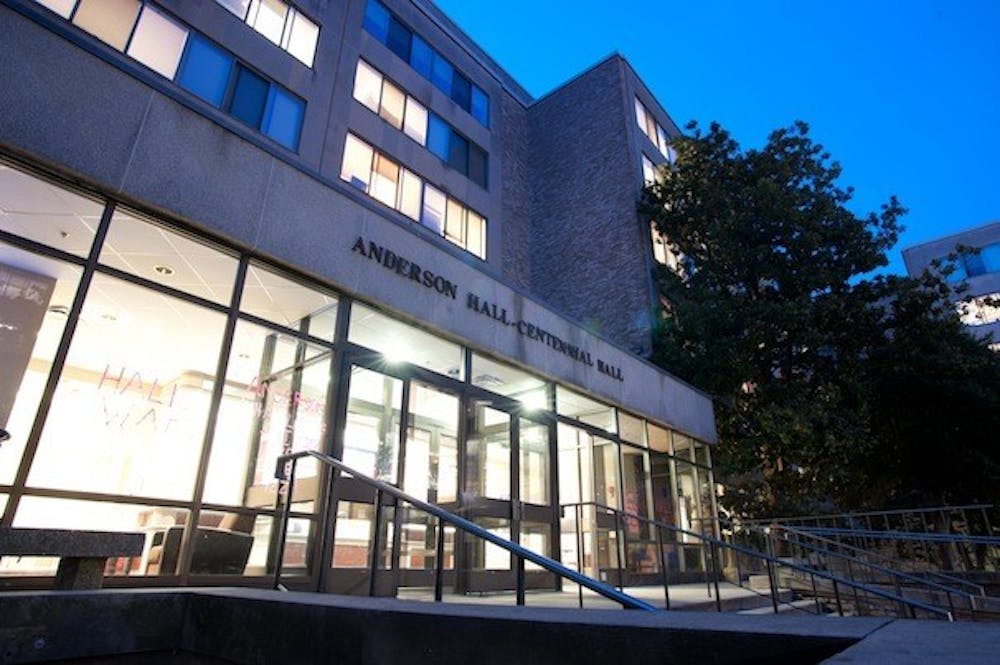AU administrators, including Dean of Students Robert Hradsky and the Department of Public Safety, are currently investigating reports of racist attacks against black students on campus.
Two black female students in the Anderson residence hall reported to Residence Life staff that white male students were running in the hallways on Sept. 8 and put boxes and a rotten banana outside one of the student’s doors and drew obscenities on her white-board. Another student reported a banana being thrown at her.
Initial rumors of the attack started circulating online on Thursday. AU Black Student Alliance (BSA) leaders contacted one of the students whose door had a box and rotten banana outside, according to Ma’at Sargeant, a sophomore in SIS and president of BSA.
“We blasted it all over social media, we made people know about it,” Sargeant said. “We put up the ‘RealAU’ posters on campus. It seems that the only way we get race issues addressed is when we make it a big deal.”
Following outcries from BSA and other student groups, University administrators released a statement condemning the attack and called for a town hall at 1 p.m. on Friday.
“We’re working with student leaders and others in the community concerned about this. At 1:00 p.m. today, we are holding a Town Hall in Butler Board Room to listen to student groups and the community at large about the climate, discuss the facts as we know them, and provide an update on the incident. The entire AU community is invited to participate,” the statement read. “The University condemns discrimination and discriminatory harassment and all violations are handled through the Student Conduct process.”
Sargeant and Jada Bell, a sophomore in SPA and also a leader in BSA, said that they felt the town hall was not a sufficient response to the events or to the frequent occurrences of racism on AU’s campus.
“A lot of people shared their hurt. There is racism on campus but it is not being addressed. Also since it was announced last minute, turnout was low. I think the wrong people show up to these events,” Bell added, “You will always get the people affected by it. The minorities on campus, the victims of sexual assault; you rarely get the people who are committing these problematic acts and statements.”
There is not yet an official Student Government response to the attacks, according to SG President Devontae Torriente, though he expects the organization to work with the administration to better respond to students who feel marginalized on AU’s campus.
“I would like us to not only listen to the experiences of students who are marginalized and feel unsafe, but that we continue to work toward devising solutions together as a community,” Torriente said. “It’s going to be difficult, emotional and disheartening to hear what black students and students of color have experienced on our campus, but I am optimistic that we’ll be able to move forward together and repair our fractured community”
Sargeant and Bell said they feel the University has not taken proper action in notifying students about racial attacks in an immediate and clear manner.
“When attacks happen like this, there is supposed to be an AU alert sent out and that is never sent out in terms of racist acts,” Sargeant said. “If you [the University] are not going to publicize these events, we need to because the campus needs to know what is happening.”
BSA leaders have organized a demonstration for Monday at 4 p.m. outside MGC in order to increase awareness about the recent incidents and to pressure the administration to take action against racial attacks on campus.
Sargeant said she wants to see the perpetrators face harsher consequences for their actions.
“We are pushing for [the perpetrators’] suspension,” Sargeant said. “Right now, the boys have been banned from Anderson, but that is not a sufficient consequence, especially when you can’t enforce it. The black community and other people of color are not comfortable with blatantly racist assaults.”
The attacks on the freshmen in Anderson affected many other students in the black community, according to Sargeant.
“When this happens to [a] minority community, specifically the black community, it doesn’t just affect that one person, it affects the entire community,” Sargeant said. “So now the black female community feels hurt and threatened. We feel unprotected and underrepresented,” Sargeant said.





